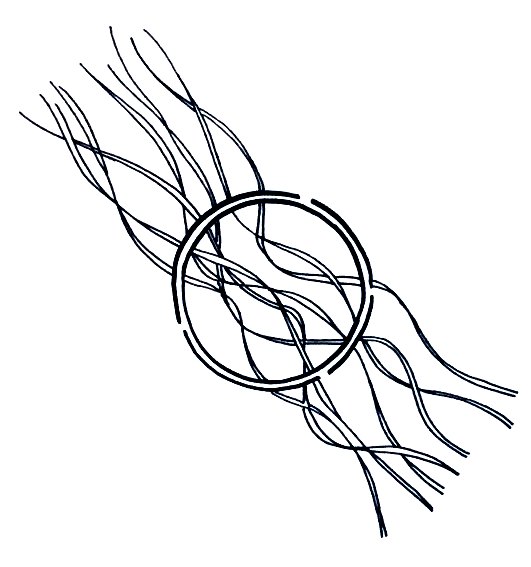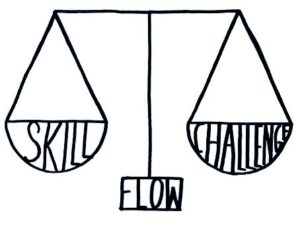– In the zone –
An introduction to flow

Have you ever been so caught up in an activity or worked feverishly towards a goal that you completely lost sense of time and place?
Such exceptional moments of ‘optimal experience’ can be lived in a state of flow.
Flow is a mental state you can reach when you are engaged in a task or activity that is both challenging and that matches your skills and abilities. When this ‘perfect’ balance is struck, it is possible to exert a task almost without effort, with a sense of ease and control.

What happens then? You enter an ‘autotelic state’: the activity becomes enjoyable and rewarding unto itself.
If, on the contrary, demands are set too low, you feel bored, and if they are set too high, you feel swamped – both of which are not exactly conducive to peak performance.
Good news is: virtually any person can experience flow – whatever their age, gender, social or cultural background and profession – as long as they are invested in an activity that is meaningful to them – be it work or leisure.
And, quite remarkable, individuals report having experienced flow under circumstances that seemingly have nothing in common, like climbing a mountain, playing a video game, performing a complex surgery, having sex…
Yet, they describe the ‘optimal experience’ they had with almost identical terms and metaphors, “being in the zone” or “feeling some form of ecstasy or natural high”.
Lose yourself
The state is characterised by intense concentration on a task, coupled with complete immersion in the present, leading to a sense of timelessness. It’s like the line between me and what I’m doing gets blurred.
A free solo climber might experience it as if his fingertips fused with minuscule ledges of rock he can hold on to.
For the time being, there is no room for self-referential thinking. The “loss” of self-awareness during flow is perhaps best pictured by “losing that inner observer” or “silencing that little voice”, that would every so often (critically) comment on what you’re doing.
An interesting question to raise now, is whether flow makes us happy?
The answer is two-fold.
Happiness is not something you will feel in the midst of the flow state – simply due to the fact that you devote all attentional resources to something else. And this is in itself absorbing enough that you don’t pause for a second to consider how happy and satisfied you are.
However, happiness is very likely to derive from the experience (in the form of ‘post-flow happiness’).
So, it is rather in retrospect, that individuals view their flow experiences as the most exceptional, memorable and even exhilarating moments in life. And that’s what makes flow a very beneficial and sought after psychological state.
At the same time, flow is elusive and difficult to grasp. You can’t really get into flow forcefully or through wishful thinking, can you?
Secrets to flow
If you want to attain a point, where you are highly efficient at what you are doing and where it doesn’t feel like a burden to you, you need to be deploying a skill (on a task) that you have highly practiced and internalised in the past.
Consider a professional alpinist on an 8000 m peak. She won’t halt at every single step thinking “how am I going to place my foot next?”.
At this stage, every step is automated and comes natural. That’s how ultimately important energy and attentional resources can be spared for a critical and unexpected event.
But, getting to this level of precision, skill and confidence – and eventually to flow – is a product of years of prior training and experience.
|
CHECK LIST: What favours flow? 1- a clear goal you know how to act upon 2- immediate feedback on your activity or project: whether you have done it right or wrong, you directly get to see the consequences of your actions. This also means you can link back a certain outcome directly to your personal effort. 3- a fine balance between your abilities and the demands of the activity 4- an autotelic personality: if you are high on intrinsic motivation, i.e. you are easily “motivated by a thing in itself” and not so much by external rewards (money, recognition), you are more likely to experience flow. This kind of personality is again associated with distinct neurobiological and genetic features. |
But, what exactly happens inside the brain during flow? And how does it relate to other mental states?
Answers in my next article:
Mindflow
Brain activity during flow
Stay tuned!
Written and published October 2020
by Jessica
List of references I used in this article:
Csikszentmihalyi, M. (1997). Finding flow: The psychology of engagement with everyday life. Basic books.
Csikszentmihalyi, M. (2000). The contribution of flow to positive psychology. In J. E. Gillham (Ed.), Laws of life symposia series. The science of optimism and hope: Research essays in honor of Martin E. P. Seligman (p. 387–395). Templeton Foundation Press.
de Manzano, Ö., Cervenka, S., Jucaite, A., Hellenäs, O., Farde, L., & Ullén, F. (2013). Individual differences in the proneness to have flow experiences are linked to dopamine D2-receptor availability in the dorsal striatum. Neuroimage, 67, 1-6.
Gold, J., & Ciorciari, J. (2020). A Review on the Role of the Neuroscience of Flow States in the Modern World. Behavioral Sciences, 10(9), 137.
Sheldon, K. M., Prentice, M., & Halusic, M. (2015). The experiential incompatibility of mindfulness and flow absorption. Social Psychological and Personality Science, 6(3), 276-283.
Yaden, D. B., Haidt, J., Hood Jr, R. W., Vago, D. R., & Newberg, A. B. (2017). The varieties of self-transcendent experience. Review of general psychology, 21(2), 143-160.